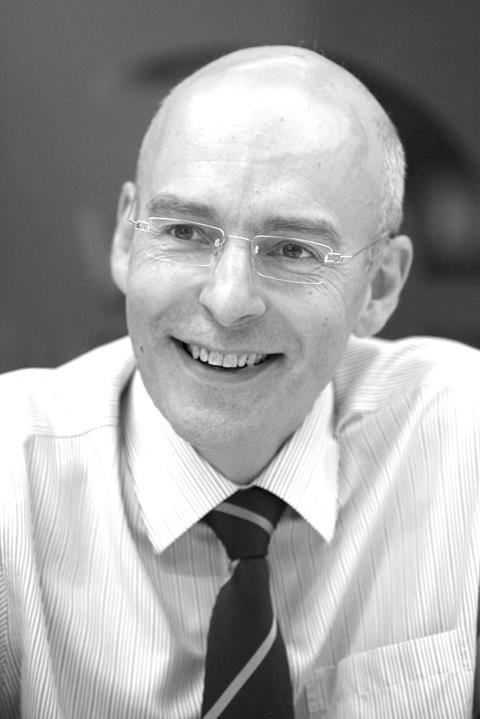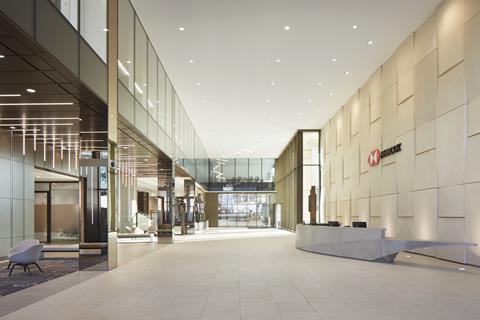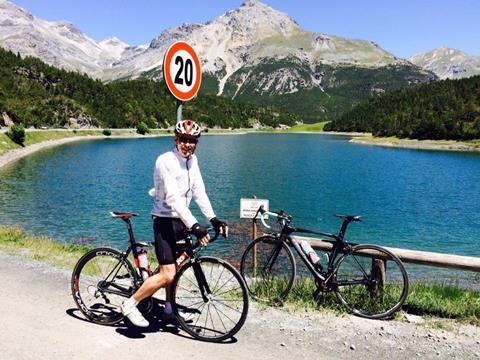An interview with David Needham, chief executive at Henry Riley
Having been a partner at Henry Riley until this month David Needham has moved into the newly created role of chief executive. He cites Apple’s Steve Jobs as one source of inspiration. “Jobs once said, ‘Great things in business are never done by one person. They’re done by a team of people’ and that’s how I’d describe my collaborative style of leadership. Build teams of great people, enable them to develop and then let them flourish.”

Does Needham still get excited by bricks and mortar? “Of course. Being involved in the creation of new spaces that bring people together and help businesses to grow and operate well is a huge privilege and responsibility. Amazing buildings that function for everyone and impact positively on people’s lives are what drives us every day and is something that we should celebrate.”
Needham has had several different roles within the company, having joined Henry Riley as a QS in 1986 before moving into project management, becoming partner in 1997 and then holding several executive leadership roles within the Henry Riley Group of Affiliated Companies. He has also worked across a wide range of construction industry sectors including retail, commercial, data centre and financial, and is considered a safe pair of hands in the industry.
Diversity and sustainability
So as he steps into his new role at Henry Riley, what are his ambitions and goals for the future? “Diversity and inclusion are high on the agenda,” says Needham. “As is sustainability, and in all cases it’s multi-level.”
What does that look like exactly? “It means making sure the business is sustainable and resilient with a broader sector and service base, while also looking at how we operate and our impact on our local communities and the wider world.”
Diversity and equality around gender, ethnicity and background is a key area for the firm. “I know from experience that diverse teams perform better,” says Needham. “While there have been positive changes in the industry, construction is still not as diverse as finance or law so we need to be more progressive and do better. We want to attract a wide range of people to our industry, like the large accountancy and law firms do and that means engaging with local schools and colleges. We want to persuade 16-year old school students and show them what a great career they can have in construction services.”
“I think we’ll move further away from individuals working in isolation and emailing. In fact, communication and collaboration platforms are already changing how we work and our working relationships will continue to be more dynamic.”
Needham also wants to look at the impact of the business on the communities they work in and the planet as a whole. “We’re committed to using local suppliers where we can. We’re also helping
Clients make decisions that will reduce their energy use for the long-term. For one data centre project, we introduced an innovative system of cooling which significantly reduced the client’s energy consumption for minimal additional capital cost.”
Career achievements
Over a 35-year career there have been some memorable projects, including the HSBC headquarters. “I was appointed programme director for the new building and it pretty much took over my life for three years!” says Needham. The £165m regeneration project on Birmingham’s Centenary Square created a new headquarters building for HSBC UK, which also included the HSBC internal university. “We moved 2,500 people into the building over four weekends. The project was hard work but the reaction we got from the HSBC teams as they moved into their new home was incredible.” Michelle Hey, head of HSBC corporate real estate said at the time: “The quality of advice and professionalism we experienced was outstanding.”

“But the project wasn’t just about construction,” says Needham. “It was about change management too and introduced a different culture of working, with flexibility, desk sharing and collaboration hubs. It’s really forward-looking.” Consequently, the project won a RICS award and was nominated for a BCO Award.
Needham has previously worked closely with the likes of Sainsbury’s, Homebase and Wickes on large scale refurbishment programmes. “We have helped Clients develop processes and systems that have enabled them to go from upgrading maybe four or five stores a year to reinvigorating over 70 stores in just one year. We have been successful in transferring these skills to other sectors too”.
Another recent project included refurbishing a data centre for a global bank while it was still in operation. “Something like that – working on a live data centre – is not high profile or award-winning but it’s a highly complex and significant project with, as you can imagine, high levels of risk management.”
But Needham cites one of the most unusual projects he ever worked on as London’s Grade I Admiralty Arch. “It was years ago, and we were appointed as cost managers. It’s a fascinating building, with huge a warren of tunnels and vaults below what you see at street level.”
New ways of working
So how have recent events affected how Henry Riley will do business in the future?
According to Needham, the pandemic has changed how we work. “It was changing anyway but it has certainly accelerated things.” So presenteeism will be a thing of the past? “Yes, you need to empower people and trust them to get the job done. The office definitely has a vital part to play in socialising, collaborating, and networking, but people will no longer need to be in an office five days a week.”
A project like the new HSBC office seems perfect for the new way of working then? “It was designed with open flexible spaces which are ideal for collaboration. We have adopted similar principles across all of our offices and so we’re well set up for future.”
And, of course, technology has a huge part to play. “I think we’ll move further away from individuals working in isolation and emailing. In fact, communication and collaboration platforms are already changing how we work and our working relationships will continue to be more dynamic. We’ve seen that it increases efficiencies and transparency too.”
A very different picture to how the industry looked back in 1980s? “Absolutely!” laughs Needham. “There were no mobiles or personal computers. We used fax machines and word processors and everything was slower and done by hand. So changes in technology have been huge.”
This has been particularly apparent during various lockdowns. With clients spread across multiple time zones, Needham would normally be jumping on a plane to go and meet them face to face. “Now projects are happening online, and we’ve all adapted quickly to various video conferencing platforms in order to maintain those all-important links with our clients.” So real life meetings may be a thing of the past? “Not quite. I really miss meeting people in person. And many clients I consider friends rather than ‘just’ clients. That’s true for everyone at Henry Riley. As a company we’re known for acting with integrity and going that extra mile and we build really strong relationships with clients through our client management programme who end up working with us for decades.”
Management style
But technology isn’t the only change Needham has seen over the last 30 years. “When I joined, the industry was old-fashioned and could be confrontational. These days if mistakes are made, we learn from them and move on. We don’t point fingers or lay blame. At Henry Riley, we believe in giving our teams autonomy, supporting colleagues in their decisions and providing guidance where needed.”
Needham is also keen to promote from within the business. “It’s important for me to recognise and develop the talent we have within the company to become leaders of the future through our various programmes and schemes. I’ve been supported throughout my own career and had some amazing opportunities, so it’s about putting some of that back in.”
So what’s next for the business? “Henry Riley is in a really good place. We’re just about to launch our ambitious new five year plan to become a more diverse and sustainable business, with our people at the heart of what we do. We’re expanding and diversifying our business to offer a wider and more comprehensive service to our clients, while building on our core values of ambition, integrity and quality.”
Personal Life

Age: 56
Family life: Needham is married to Amanda with a son at university and a daughter doing her A levels.
Education: University of Portsmouth to study quantity surveying.
Last holiday: Tuscany, Italy.
Favourite book: Anything by John Grisham.
Favourite group: The Clash
Car: BMW M4
Gadget: iPhone X
Hobbies: A keen cyclist, Needham rides a Cervelo road bike and is due to take part in La Marmotte in the French Alps in June 2021. “A few years ago, in order to raise money for charity, we cycled between the different Henry Riley offices. Unfortunately, while riding up a very steep hill, the front wheel came off the ground and I ended up falling off the back of the bike and I haven’t been allowed to forget it!”

























